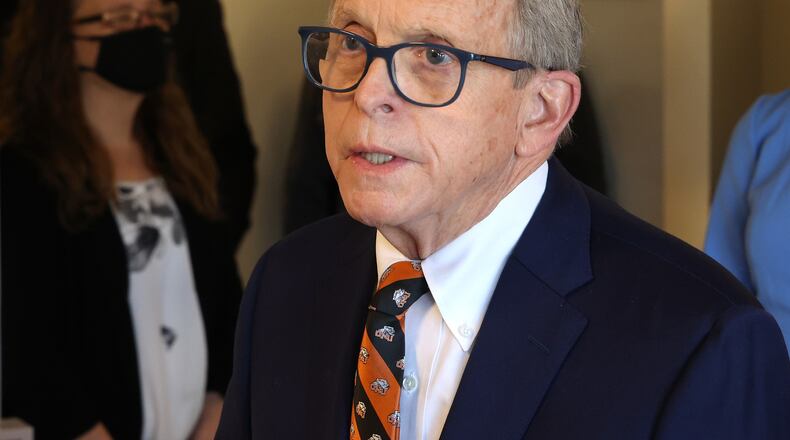State Rep. Phil Plummer, R-Dayton, the former Montgomery County Sheriff, worked with DeWine’s office on the proposal.
“These are common sense things that we can do,” DeWine said. “It should not be controversial. We can all get behind it.”
PATHWAYS TO POLICE REFORM: @GovMikeDeWine breaks down ongoing proposals he’s put forth in Ohio to address policing in his state.
— Face The Nation (@FaceTheNation) April 25, 2021
He tells @jdickerson "there’s a clear pathway" to reforms in the wake of numerous police-involved shootings. pic.twitter.com/uJwQoI8y84
DeWine made the comments while appearing on “Face the Nation” on CBS Sunday morning to speak about police reform, the police shooting of Ma’Khia Bryant in Columbus and coronavirus vaccine hesitancy.
A Columbus police officer fatally shot Bryant, a Black 16-year-old girl, on Tuesday as she swung a knife at another young woman, according to body camera footage released by the police the same day.
Speaking to the disparity in the use of force by officers on Black residents, particularly in Columbus, DeWine said: “I surely understand the feeling. I also understand the feeling of the police officer … They’ve got a tough job. They have to make split-second decisions.”
On tackling the issue of implicit bias amongst officers in his state, Ohio @GovMikeDeWine tells @jdickerson of a push for training: "I've never met a police officer that didn't want more training" pic.twitter.com/pK6HVIyJBq
— Face The Nation (@FaceTheNation) April 25, 2021
DeWine reiterated that it’s important to get training to all Ohio officers on implicit bias, de-escalation and dealing with somebody with a mental health problem.
Asked about getting rid of qualified immunity for law enforcement officers in Ohio, DeWine said, “I’m sure we will take a look at that, but I’ve really not looked at that to see what impact that does have.”
Qualified immunity is the legal principle that shields government officials, including law enforcement officers, from being sued unless they violate rights clearly established in law.
Some states, like New Mexico and Colorado have largely done away with qualified immunity for police officers. Is Ohio considering similar moves? @GovMikeDeWine tells @jdickerson that “we have not really had a discussion,” but that he will take a look at it. pic.twitter.com/TyK4vxMgA1
— Face The Nation (@FaceTheNation) April 25, 2021
Speaking about the slowing coronavirus vaccine rollout, DeWine said Ohio has seen its vaccination rate drop to about half of what it was three weeks ago.
“I’m concerned about it,” he said. “One of the things that we’re doing is now we’re reaching out to businesses, and providing for vaccinations directly in businesses. We’re doing the same thing in our colleges, we’re doing it in our high schools. We have to be more aggressive.”
Ohio Republican @GovMikeDeWine on vaccine hesitancy during COVID-19 amid latest polling showing many in GOP don't plan to get vaccinated: “I'm worried," he says as vaccination rates in his state are going down. "The game is not over." pic.twitter.com/9zc6Y7koMa
— Face The Nation (@FaceTheNation) April 25, 2021
A new poll from CBS found that 22% of Americans say they will not get the coronavirus vaccine and 18% say they will maybe get it. Republicans remain more skeptical of the vaccine, with about half of Republicans expressing hesitancy.
About 30% of Ohio residents had been fully vaccinated and about 39% had received at least one dose as of Sunday, according to the Ohio Department of Health website.
About the Author

